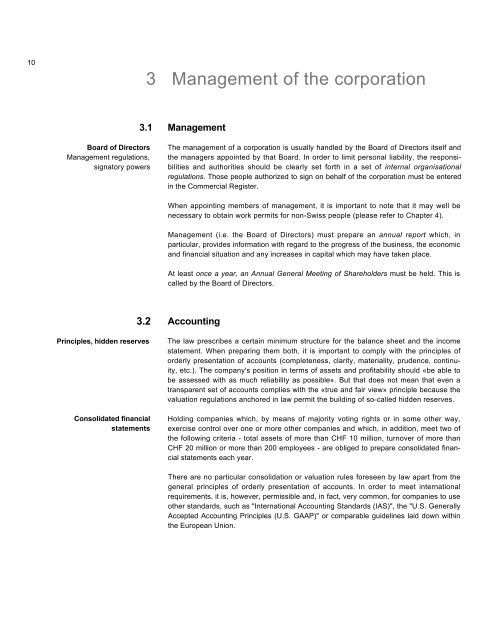zug : doing business. - Swiss Registry Consulting
zug : doing business. - Swiss Registry Consulting
zug : doing business. - Swiss Registry Consulting
You also want an ePaper? Increase the reach of your titles
YUMPU automatically turns print PDFs into web optimized ePapers that Google loves.
10<br />
Board of Directors<br />
Management regulations,<br />
signatory powers<br />
3 Management of the corporation<br />
3.1 Management<br />
3.2<br />
Principles, hidden reserves<br />
Consolidated financial<br />
statements<br />
The management of a corporation is usually handled by the Board of Directors itself and<br />
the managers appointed by that Board. In order to limit personal liability, the responsibilities<br />
and authorities should be clearly set forth in a set of internal organisational<br />
regulations. Those people authorized to sign on behalf of the corporation must be entered<br />
in the Commercial Register.<br />
When appointing members of management, it is important to note that it may well be<br />
necessary to obtain work permits for non-<strong>Swiss</strong> people (please refer to Chapter 4).<br />
Management (i.e. the Board of Directors) must prepare an annual report which, in<br />
particular, provides information with regard to the progress of the <strong>business</strong>, the economic<br />
and financial situation and any increases in capital which may have taken place.<br />
At least once a year, an Annual General Meeting of Shareholders must be held. This is<br />
called by the Board of Directors.<br />
Accounting<br />
The law prescribes a certain minimum structure for the balance sheet and the income<br />
statement. When preparing them both, it is important to comply with the principles of<br />
orderly presentation of accounts (completeness, clarity, materiality, prudence, continuity,<br />
etc.). The company's position in terms of assets and profitability should «be able to<br />
be assessed with as much reliability as possible». But that does not mean that even a<br />
transparent set of accounts complies with the «true and fair view» principle because the<br />
valuation regulations anchored in law permit the building of so-called hidden reserves.<br />
Holding companies which, by means of majority voting rights or in some other way,<br />
exercise control over one or more other companies and which, in addition, meet two of<br />
the following criteria - total assets of more than CHF 10 million, turnover of more than<br />
CHF 20 million or more than 200 employees - are obliged to prepare consolidated financial<br />
statements each year.<br />
There are no particular consolidation or valuation rules foreseen by law apart from the<br />
general principles of orderly presentation of accounts. In order to meet international<br />
requirements, it is, however, permissible and, in fact, very common, for companies to use<br />
other standards, such as "International Accounting Standards (IAS)", the "U.S. Generally<br />
Accepted Accounting Principles (U.S. GAAP)" or comparable guidelines laid down within<br />
the European Union.


